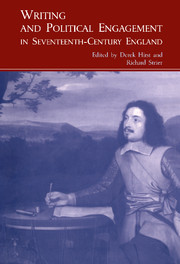Book contents
- Frontmatter
- Contents
- Notes on contributors
- Dedication
- Introduction
- 1 “I am Power”: normal and magical politics in The Tempest
- 2 “Void of storie”: the struggle for insincerity in Herbert's prose and poetry
- 3 Sir Kenelm Digby's rewritings of his life
- 4 Thomas Hobbes and the Renaissance studia humanitatis
- 5 Casuistry and allegiance in the English Civil War
- 6 Thomas May and the narrative of civil war
- 7 Samuel Parker, Andrew Marvell, and political culture, 1667–73
- 8 Sidney's Discourses on political imagoes and royalist iconography
- Notes
- Index
5 - Casuistry and allegiance in the English Civil War
Published online by Cambridge University Press: 09 September 2009
- Frontmatter
- Contents
- Notes on contributors
- Dedication
- Introduction
- 1 “I am Power”: normal and magical politics in The Tempest
- 2 “Void of storie”: the struggle for insincerity in Herbert's prose and poetry
- 3 Sir Kenelm Digby's rewritings of his life
- 4 Thomas Hobbes and the Renaissance studia humanitatis
- 5 Casuistry and allegiance in the English Civil War
- 6 Thomas May and the narrative of civil war
- 7 Samuel Parker, Andrew Marvell, and political culture, 1667–73
- 8 Sidney's Discourses on political imagoes and royalist iconography
- Notes
- Index
Summary
“I am resolved by Gods grace to keep my conscience.”
Many years after the English Civil War Captain John Hodgson reflected on the examination of conscience he had then undertaken: “When I put my hand to the Lord's work, in 1642, I did it not rashly, but had many an hour and night to seek God, to know my way.” In 1645 Sir William Campion had written in similar terms to an old friend and present enemy, “I did not rashly or unadvisedly put my life upon this service, for it was daily in my prayers for 2 or 3 months together to God to direct me in a right way, and besides I had conference with diverse able and honest men for advice who confirmed me in my judgment.”
Hodgson was a long-serving soldier of parliament, and we are familiar with prayer and conference as the means by which godly men resolved hard questions, but Campion was a respected royalist who was to die in 1648 in the fruitless defense of Colchester. Both men, however, presented the decision to take action as a decision of conscience reached only after serious reflection. The Civil War, as John Wallace pointed out, “presented itself … as the most colossal case of conscience” of most Englishmen's lives, and forced them to seek “to discern what God's part demanded.” Hodgson's “serious thoughts” led him to join those who, foreseeing evil, “prepare[d] such instruments as they possibly could to defend themselves” against the king.
- Type
- Chapter
- Information
- Publisher: Cambridge University PressPrint publication year: 2000
- 1
- Cited by

